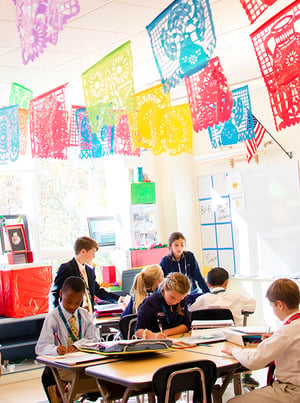(Narrator)
 Hi I’m Chris Starr, host of the new Peck Podcast. Welcome to Season 1 Episode 2. We have somehow stumbled upon a three part series. For our first episode, we explored the notion of teaching and learning Latin in a middle school. We had so much fun getting to know Latin Instructor David Marshall, exploring his passion for the language and learning how Latin is like solving a puzzle, that we decided to dedicate our next two episodes to the Spanish and French programs at Peck. So let’s get started with Spanish teacher and head of our foreign languages department, Molly Donnelly.
Hi I’m Chris Starr, host of the new Peck Podcast. Welcome to Season 1 Episode 2. We have somehow stumbled upon a three part series. For our first episode, we explored the notion of teaching and learning Latin in a middle school. We had so much fun getting to know Latin Instructor David Marshall, exploring his passion for the language and learning how Latin is like solving a puzzle, that we decided to dedicate our next two episodes to the Spanish and French programs at Peck. So let’s get started with Spanish teacher and head of our foreign languages department, Molly Donnelly.
(Molly)
Me llamo Molly Donnelly y soy maestra en la Escuela Peck.
(Narrator)
For Molly, learning to speak a foreign language is like unlocking a door to a distant world, or perhaps just the world right outside your doorstep.
(Molly)
The beauty of Spanish is that it’s right here – it’s everywhere. If you look at just the community that we have in Morristown, there are so many Spanish speakers. So it’s this incredibly useful language.
(Short scene with sounds from a Spanish class Molly is teaching)
(Narrator)
Molly has an assignment to illustrate to her students how tangible Spanish is in our community.
(Molly)
One of the first things that I do is I say, “Go home and look for something in your house that has Spanish on it.” And they bring it in, and they share what they found. And the whole point is, it’s on your box of rice. It’s on the bar of soap. It’s everywhere that you look. It connects you to your community. It connects you to the people and the culture.
(Narrator)
Not only is Spanish so tangible. It’s a practical bridge within our community.
(Molly)
Learning any language is building a bridge and making a connection with a culture, but also with human beings that you think may live a life that is so different than yours. The language can connect you.
(Narrator)
Language is the universal connector. And I asked Molly if there were any particular experiences or special memories that would only have been possible for her because she learned Spanish.
(Molly)
The spring of my junior year, I went and studied abroad in Barcelona. I lived with a family. One of my brothers and my mom came to visit. We were having dinner with them and I was so excited for my brother and my mom to meet this family that I had been living with. And I think as a parent, my mom was excited to meet this couple that had been taking care of her daughter. I became this kind of liaison between the two sides and it made me feel so connected to my own family, but also to them. It just felt that this language, and my study of it, was helping me to connect these four people I cared so deeply about.
(Chris – to Molly)
Language is an emotional thing. And I can sense, as you were talking about that, you get emotional about it.
(Molly)
I remember when I went to Spain, and I said to my mom, “What if I don’t do well speaking it? I remember her saying, “Would you ever laugh at someone who was trying to speak English?” and I said, “No. I would want them to know that we would love to connect with that person.” And she said, “That’s exactly how it’s going to be when you go somewhere else.”
(Narrator)
So, what does it feel like to learn and speak Spanish Molly-style?
(Short scene from a Spanish class with Molly)
(Molly)
I know that learning a language is messy. In my classroom I really try to promote an environment where everyone is comfortable taking risks, making mistakes. No one is going to pronounce everything perfectly, write everything perfectly, and that someone else’s mistake can help everybody figure it out.
(Narrator)
Peck has really invested in teaching Spanish. Students begin their study of the language as early as kindergarten. By Upper School, it’s not so much that they are learning a foreign language; Spanish is becoming a second language.
(Molly)
Teaching kids a language at a young age is a huge opportunity. They’re just wonderful learners. They deep dive into not just the language. They learn about pastimes, and music, and food. It is a huge advantage for the students to learn, beginning at such a young age, and then for me. So when they arrive to fifth grade, they have a good foundation. I can build from there. So we can get into things sooner than I used to be able to. I can start the sixth grade year reading a small novel.
(Narrator)
Having that continuum in Spanish from kindergarten to eighth grade creates special opportunities in the curriculum.
(Molly)
I can pair a sixth-grade class with a second-grade class to do a Day of the Dead activity. If Costa Rica is the country that they are studying in the Lower School, the eighth grade will break up different parts of studying Costa Rica and go and teach it to the younger kids. We get together at various times throughout the year to do an activity together.
(Short scene from a Spanish class with Molly)
(Molly)
They’re the ones that are answering the questions. They’re responding in Spanish. They’re putting the puzzle together on their own.
(Narrator)
There’s that puzzle reference again. See episode 1, season 1!
(Molly)
They’re, I think, in charge of a lot of it themselves, putting the puzzles together.
(Narrator)
First Latin, and now Spanish, is like putting together a puzzle. This is starting to be a recurrent theme in our interactions with Peck language teachers.
(Molly)
Teaching a child something and having them be excited about it, or have that moment where they get it, changes something. It shifts something in them; where they feel confident. It’s a wonderfully gratifying experience, and it’s so motivating to me to then find lots of different ways to have that light bulb moment. I think we are all striving for that moment where a student is genuinely excited about learning.
(Narrator)
Well, thanks to Molly for sharing her passion for Spanish.
(Chris to Molly)
You were fantastic, and I love the passion you have for not only teaching but for the language itself.
(Molly)
Thank you.
(Narrator)
Tune in next, for part three in our language series – a discussion with Upper School French teacher Tyler Moseley.
(Molly)
Alcunas idiomas son interesantes, pero español es el major!
(Chris)
OK, now what does that mean?
(Molly)
Other languages may be interesting, but Spanish is the best!





